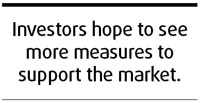Market-stabilizing act
(China Daily)
Updated: 2008-04-22 07:28
Updated: 2008-04-22 07:28
The introduction of the block trading system is a much-needed step to standardize sales of a large number of shares newly freed from the lock-in period. It shows that the securities authorities have fully recognized the negative impact that uncontrolled sales of such shares may have on the stock market.
Policymakers should take more such actions to plug loopholes underlying the regulatory system.
China Securities Regulatory Commission announced late Sunday that shareholders should use the block trading system while selling more than 1 percent of a listed firm's total shares within a month.

The announcement has triggered knee-jerk reactions. China's benchmark Shanghai Composite Index jumped nearly 7 percent early Monday after diving nearly 4 percent to almost half of its highest level on the previous trading day.
In the midst of all the negative factors, including the huge volatility on the global financial market, an export-led slowdown of the national economy, and rising prices of energy, resources and grain at home and abroad, lingering concerns about an over-supply of previously locked-up shares have particularly dampened investor sentiment.
As a result of a program the government started in 2005 to convert mostly State-held non-tradable stocks into tradable ones, shares worth 1.7 trillion yuan will be eligible for trading this year and those worth another 4.3 trillion yuan in 2009 as lock-up periods end.
In the absence of any regulation, investors generally worried that the huge number of such shares would flood the market for cash and therefore sink share prices.
Now, by helping ease the pressure on the secondary market and stabilizing investors' expectation on the reduction of the holdings of such shares, the move will give a boost to the market.
Investors were obviously relieved by the fact that the government has finally stepped in.
Yet, the stock climb was so short-lived that the benchmark Shanghai Composite Index even turned negative before ending flat later yesterday.
The latest market-stabilizing effort has seemingly been interpreted only as an expedient measure to stop the market decline. It is hence reasonable for investors to hope that more measures to support the market will follow.
Policymakers should pay attention to such calls, but not respond out of merely immediate concerns. The more important job for them is to work out long-term measures that underpin a healthy development of the stock market.
(China Daily 04/22/2008 page8)
|
||
|
||
|
|
|
|